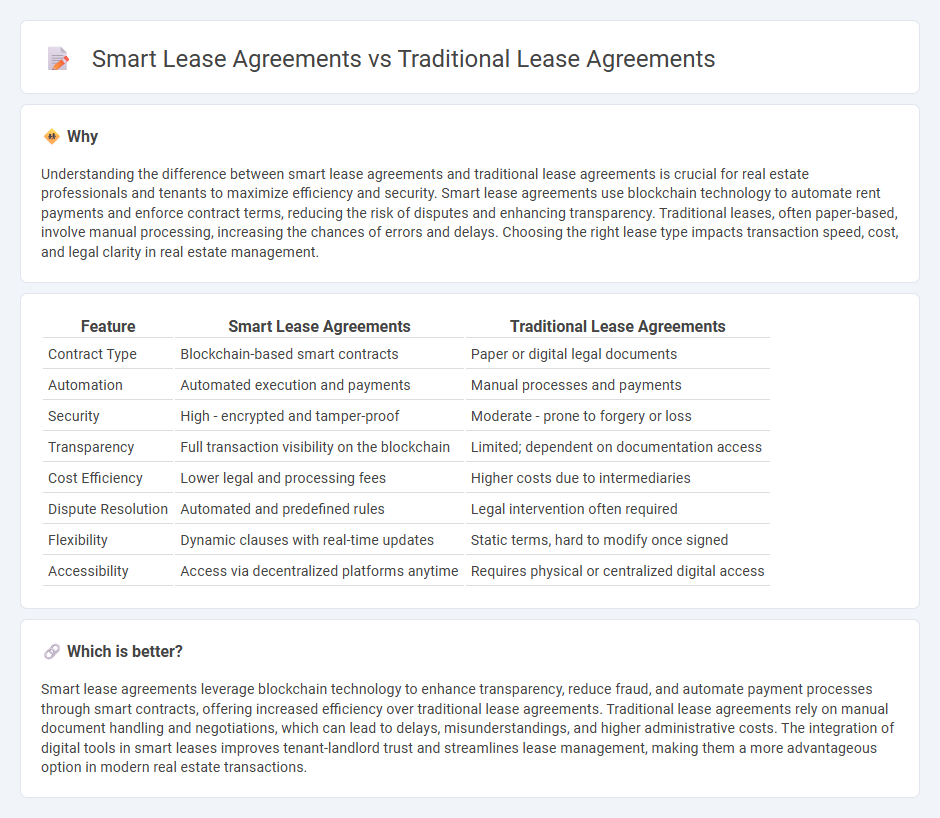
Smart lease agreements leverage blockchain technology and automated smart contracts to ensure transparent, secure, and efficient property rental processes compared to traditional lease agreements that often rely on manual paperwork and slower verification methods. These digital contracts reduce the risk of fraud, simplify payment tracking, and streamline dispute resolution, enhancing tenant and landlord experiences. Discover more about how smart lease agreements are transforming the real estate rental landscape.
Why it is important
Understanding the difference between smart lease agreements and traditional lease agreements is crucial for real estate professionals and tenants to maximize efficiency and security. Smart lease agreements use blockchain technology to automate rent payments and enforce contract terms, reducing the risk of disputes and enhancing transparency. Traditional leases, often paper-based, involve manual processing, increasing the chances of errors and delays. Choosing the right lease type impacts transaction speed, cost, and legal clarity in real estate management.
Comparison Table
| Feature | Smart Lease Agreements | Traditional Lease Agreements |
|---|---|---|
| Contract Type | Blockchain-based smart contracts | Paper or digital legal documents |
| Automation | Automated execution and payments | Manual processes and payments |
| Security | High - encrypted and tamper-proof | Moderate - prone to forgery or loss |
| Transparency | Full transaction visibility on the blockchain | Limited; dependent on documentation access |
| Cost Efficiency | Lower legal and processing fees | Higher costs due to intermediaries |
| Dispute Resolution | Automated and predefined rules | Legal intervention often required |
| Flexibility | Dynamic clauses with real-time updates | Static terms, hard to modify once signed |
| Accessibility | Access via decentralized platforms anytime | Requires physical or centralized digital access |
Which is better?
Smart lease agreements leverage blockchain technology to enhance transparency, reduce fraud, and automate payment processes through smart contracts, offering increased efficiency over traditional lease agreements. Traditional lease agreements rely on manual document handling and negotiations, which can lead to delays, misunderstandings, and higher administrative costs. The integration of digital tools in smart leases improves tenant-landlord trust and streamlines lease management, making them a more advantageous option in modern real estate transactions.
Connection
Smart lease agreements integrate blockchain technology to automate contract execution and enforce terms, enhancing transparency and reducing disputes in real estate transactions. Traditional lease agreements provide the legal framework and essential terms that smart contracts digitize, ensuring compliance and clarity. This connection bridges conventional legal practices with advanced technology, streamlining property leasing processes and improving tenant-landlord interactions.
Key Terms
Contractual Terms
Traditional lease agreements often involve lengthy paperwork with fixed terms that can limit flexibility and require manual updates for amendments. Smart lease agreements utilize blockchain technology and smart contracts to automate execution, enforce terms transparently, and allow real-time modifications based on predefined rules. Discover how smart lease agreements can revolutionize rental contracts by enhancing security and efficiency.
Automation
Traditional lease agreements rely heavily on manual processes such as paper documentation, physical signatures, and in-person negotiations, which often result in delays and increased administrative costs. Smart lease agreements use blockchain technology and smart contracts to automate tasks like rent collection, payment tracking, and contract enforcement, significantly reducing human error and expediting transactions. Explore how automation in smart lease agreements can transform property management by increasing efficiency and transparency.
Transparency
Traditional lease agreements often involve lengthy paper documents with clauses that can be difficult to interpret, leading to potential misunderstandings between landlords and tenants. Smart lease agreements leverage blockchain technology to provide immutable, transparent records that automatically execute contract terms, enhancing clarity and trust for all parties. Explore how smart leases are revolutionizing transparency in rental contracts to benefit both landlords and tenants.
Source and External Links
The Ultimate Guide to Lease Agreements - This guide discusses the advantages and challenges of traditional lease agreements, including personal interaction and the logistics of physical documentation.
Lease Agreement: A Complete Guide in 2025 + Free Template - This comprehensive guide covers key elements of lease agreements, applicable to both residential and commercial properties, including property description and rent payment details.
Types Of Rental Lease Agreements You Should Know - This article explores different types of rental lease agreements, such as fixed-term leases, and highlights the importance of including necessary details and clauses for protection.
 dowidth.com
dowidth.com